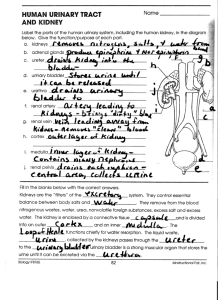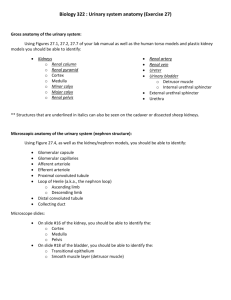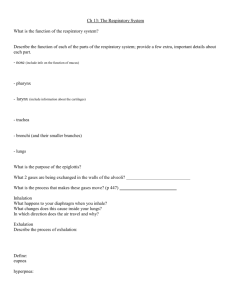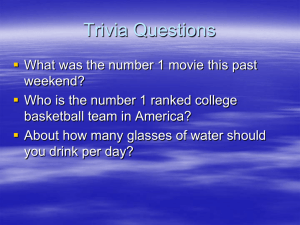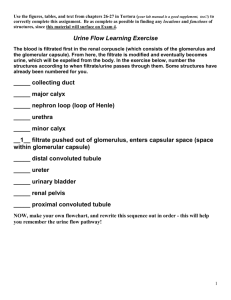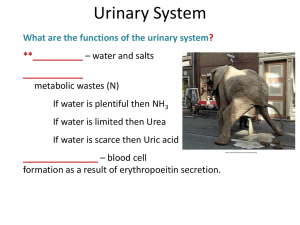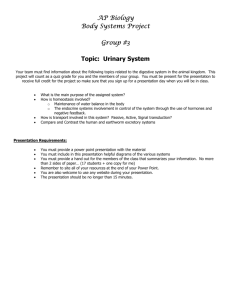Urogenital
advertisement
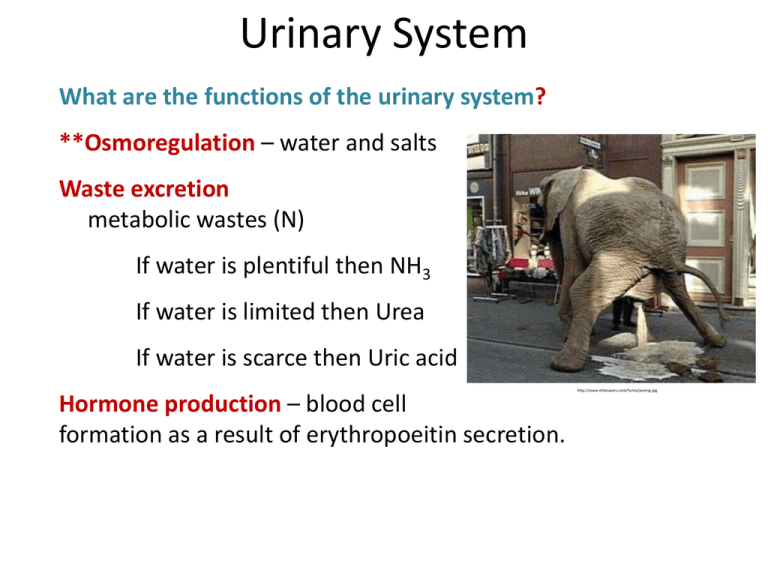
Urinary System What are the functions of the urinary system? **Osmoregulation – water and salts Waste excretion metabolic wastes (N) If water is plentiful then NH3 If water is limited then Urea If water is scarce then Uric acid Hormone production – blood cell formation as a result of erythropoeitin secretion. http://www.elitesavers.com/funny/peeing.jpg Urinary System What are the “rules of thumb” regarding water and salts for different classes of vertebrates? Fresh water organisms – excrete water and conserve salt Salt water organisms – excrete salt and conserve water Terrestrial organisms – modify salt and water loss appropriately Urinary System What is the basic pattern and what is an archinephros? Nephron – functional unit of kidneys Renal corpuscle: 1) Glomerulus 2) Renal tubules 3) Excretory ducts Urinary System What is the basic pattern and what is an archinephros? Nephron – functional unit of kidneys Renal corpuscle – Urinary System What are the 3 basic processes involved with urine formation? 1) Filtration – glomerulus 2) Reabsorption – renal tubules 3) Secretion – renal tubules Other processes include: 4) Concentration – renal tubules and collecting ducts 5) Storage – bladder 6) Micturition – bladder, sphincters & urethra Urinary System Where does filtration take place? Renal corpuscle = glomerulus & Bowman’s capsule Bowman’s capsule = parietal and visceral layers Urinary System What is involved with producing filtrate? Filtration Pressure… Flow depends on pressure Fluids and solutes move from > press. to < press. Why is there a difference in pressure? GCP = Glomerular capillary pressure CP = Capsule pressure COP = Colloidal osmotic pressure Urinary System What is the route of blood flow through the kidney and how does this fit with REABSORPTION? Afferent arteriole to glomerulus to Efferent arteriole to peritubular capillaries to vasa recta, then back out Urinary System What is the role of secretion in urine production? Moving wastes into nephron both passive and active Passive (NH3) Active / countertransport (ex. H+, K+, Penicillin) Urinary System How is urine concentrated? Urinary System How do kidneys form embryologically? Nephrogenic mesoderm – lateral to mesodermal somites Where are the kidneys in Necturus? Tubules appear at cephalic end Paired ducts develop and form caudad until they reach posterior and form opening Posterior tubules Urinary System What is an archinephros? Hypothetical “kidney”– Believed to be the prototype from a segmented ancestor Urinary System Urinary System Why would glomeruli be larger in freshwater fish and aquatic amphibians… and smaller in marine fishes and tetrapods (especially in tetrapods of arid environments)? Urinary System How are kidneys organized? Urinary System Where can one find a kidney? Location: Small of your back Size: fist-sized Surrounded by connective tissue (renal capsule) Protected by renal fat pad (perirenal fat) Urinary System Gross anatomy! retroperitoneal peritoneal cavity Urinary System What is extrarenal salt excretion and how does it occur? Gills – actively transport across lamellar membranes Salt glands – can empty into nasal canals or mouth http://animals.nationalgeographic.com/staticfiles/NGS/Shared/StaticFiles/animals/images/primary/marine-iguana.jpg What other anatomy is significant? Transitional epithelium lines the ureters & urinary bladder Stratified & Stretchy Contract = peristaltic movements What other anatomy is significant? Transitional epithelium lines the ureters & urinary bladder Stratified & Stretchy Contract = peristaltic movements
